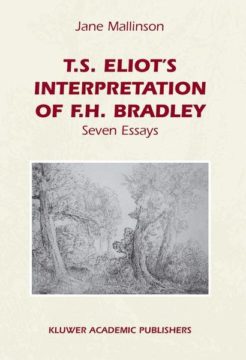T. S. Eliot’s work as poet and as critic can be seen as a protracted exploration of his engagement with the work of the philosopher F. H. Bradley. The dissertation which Eliot completed in 1916 is the repository of his philosophical investigations up to that time and the source of many of his subsequent ideas. The thesis is not merely an attempt to explicate Bradley’s metaphysics, but a critical enterprise involving explicit disagreements as well as qualified assent. While I argue that his expressed disagreements with Bradley offer an invaluable insight into Eliot’s view of language and more particularly the poet’s relationship with language, I also believe that his avowed rejection of Bradley’s metaphysical system and concomitant theory of knowledge did not prevent him from using it as a model to describe the nature of poetry and of its appreciation. Previous studies of the connection between Eliot’s 1 philosophical writings and his poetry and criticism have ignored his disagreements with Bradley in the attempt to trace the Bradleian vein, while those which have eloquently argued the case for perceiving in Eliot’s work the seeds of contemporary 2 philosophical positions tend to credit Eliot with what are in fact Bradley’s views. The current resurgence of interest in Anglo American Idealism has resulted in a clarification and reassessment of Bradley’s work which is not only important in itself but also enables a rectification of these distortions.
- Veröffentlicht am Samstag 4. Dezember 2010 von Springer Netherland
- ISBN: 9789048161621
- 102 Seiten
- Genre: 20., 21. Jahrhundert, Hardcover, Philosophie, Softcover
